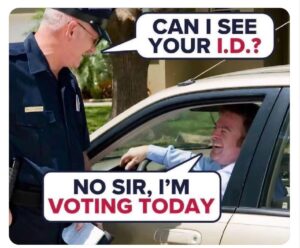Spotlight on Voter ID Legislation: A Critical Look from Extreme Investor Network

In a bold move that has sparked heated debate across the nation, former President Donald Trump has signed an executive order requiring voters to present identification as proof of citizenship. This decision has provoked considerable backlash from the Democratic Party, including a lawsuit filed against the former president by the Democratic National Committee (DNC), House Minority Leader Hakeem Jeffries, and Senate Minority Leader Chuck Schumer. The suit alleges that Trump’s actions reflect "conspiratorial beliefs" and "election denialism," claiming he lacks the legal authority to impose such sweeping changes on the electoral process.
Understanding the Rationale Behind Voter ID Laws
Proponents of voter ID laws argue that presenting identification is a reasonable requirement to safeguard the integrity of the democratic process. After all, identification is necessary for numerous day-to-day activities: boarding a plane, opening a bank account, or purchasing age-restricted products like alcohol. Yet, the DNC contends that this requirement amounts to voter suppression, particularly targeting communities that may struggle to obtain IDs.
A recent Gallup poll indicates that a significant majority—approximately 84% of Americans—support the notion that photo identification should be necessary to vote. This underscores a growing consensus that non-citizens, who do not contribute to the system, should have curtailed influence over national affairs. In fact, when we look at democratic practices globally, most developed nations follow similar identification mandates to maintain electoral integrity.
The Political Landscape: A Fragmented Democratic Party
The political complexities surfaced by the voter ID debate are symptomatic of broader issues within the Democratic Party. Once the bastion of liberal ideals, the party now appears divided—fragmented between a faction advocating for foreign military support and open borders, and another that emphasizes humanitarian efforts at home. This strife has led to a drastic decline in public support, with a recent Quinnipiac poll reporting approval ratings for Democrats at a historic low of 21%.
Rather than addressing the public’s concerns, party leaders seem to be doubling down on policies that have become increasingly unpopular. Notably, Chuck Schumer’s admission regarding judicial appointments reveals a commitment to partisan hostility rather than constituent representation.
Conclusion: The Path Forward
As the voter ID lawsuit progresses, either side of the political spectrum must take a hard look at what this represents for American democracy. The voice of the electorate is crucial, and it seems the call for straightforward solutions like voter ID requirements resonates with many Americans who wish to see elections conducted with integrity and transparency.
At Extreme Investor Network, we believe in empowering citizens through access to clear and accurate information. The discourse around voter identification is just one aspect of a much larger economic and political narrative that needs addressing. Stay tuned to our blog for ongoing insights into policy changes and their implications for the economy and society at large.
Your engagement and voice matter. How do you feel about the requirements for voter identification? Join the conversation as we navigate the intersection of economics, politics, and civic rights together.

